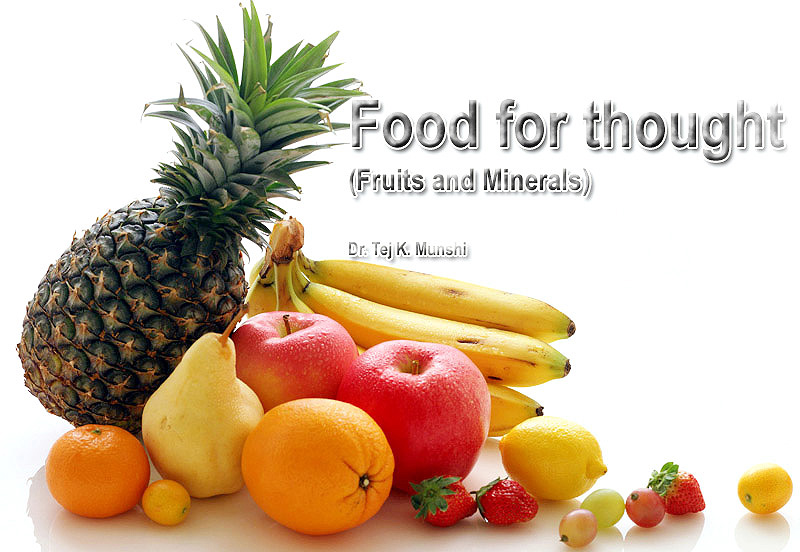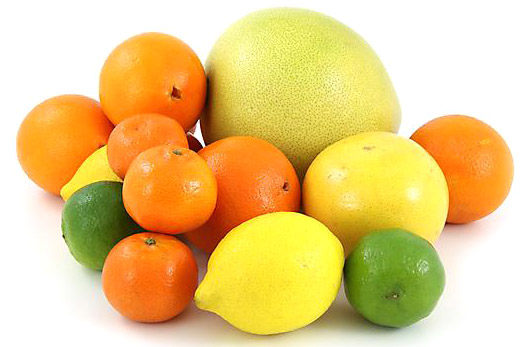Food for thought
 |
 |
|
Super fruits and their benefits: These are excellent sources of antioxidants, fiber, vitamins and minerals.
Minerals: Minerals are another group of essential nutrients needed to both regulate body processes and give your body structure. Like vitamins, minerals help trigger, or regulate body processes, that are essential to our life. From a dietary perspective, minerals belong in two categories----major minerals and trace minerals----depending on how much you need. They are all essential. Major minerals: Calcium, phosphorus and magnesium fit in this category along with three clectrolytes----sodium, potassium and chlorine. Trace minerals: Your body needs just small amounts---fewer than 20 mg daily of each of the trace elements: Chromium, copper, iron, manganese, molybdenum, selenium, zinc and iodine. Major minerals: Calcium builds bones in both length and strength. Helps muscles contract and your heart beat, and plays role in normal nerve functions; helps blood clot. For adult males, allowance is 1000 mg of calcium and for women 1200 mg daily. Phosphorus: For adults intake more than 700 mg daily is ideal. Protein rich foods---milk, meat, poultry, fish and eggs--- contain the most. Beans (legumes) and nuts are good sources as well. Magnesium: Serves an important part of more than 300 body enzymes that regulate body protein and help regulate blood glucose levels; keeps heart rhythm and normal bp. The best sources of magnesium are beans (legumes), nuts and whole grains. Green vegetables are good sources, too, because chlorophyll contains magnesium. Chlorine: Helps regulate fluids in and out of body cells. As a component of stomach acid it helps with the digestion of food and absorption of nutrients, besides helping transmit the nerve impulses. Adequate intake for all ages 9-50, is 2000 mg a day provided by salty foods. Potassium: Helps regulate fluids and mineral balance in and out of body cells. It helps maintain normal bp, reduce risk of kidney stones and bone loss. Adequate intake level for potassium is 4500 mg daily that is especially found in fruits, fish and nuts. Banana has 430 mg potassium; almonds 210, and potato 330 mg. Sodium: Helps muscle including your heart to relax. Helps transmit nerve impulse or signals to regulate bp. The adequate intake for adults is 1300 mg a day. As a reference, quarter spoon of salt contains 500 mg of sodium. Chromium: Works with insulin to keep your body use blood glucose or blood sugar. If you consume lesser than 35 micrograms per day, a deficiency can look like diabetes since it works closely with insulin. It’s mostly found in meat, eggs, whole grain products, vegetables and fruits. Copper: Helps your body make hemoglobin, needed to carry oxygen in red-blood cells. Serves as a part of many body enzymes and helps your body produce energy in the cells. The ideal intake has been set as 900 micrograms daily for adults, mostly found in organ meats----liver, sea food, nuts and seeds. Cooking in copper pots increases this mineral in food. Manganese: It serves as a partner of many enzymes including RNA and DNA. It helps in bone formation and metabolizes energy from carbohydrates, fats and proteins. The optimum allowance is set at 2.3 mg of manganese daily for adults. Manganese is widely distributed in foods like whole grain products, some fruits and vegetables. Tea is a rich source of manganese. Iron: Serves as an essential part of hemoglobin, which carries oxygen in your blood from lungs to every body cell, along with enzymes. It helps change beta-carotene to vit.A, helps make body protein, brain development and support a healthy immune system. The ideal dose for adult men is 8 mg daily and for females 18 mg. Inadequate stores in body can cause anemia and tiredness. Iron is widely available from foods of both animal (heme-iron) and plant (non-heme) sources. Heme iron sources are liver, chicken, pork, salmon, eggs etc. Non-heme are: pumpkin, soyabean, nuts, spinach and beans. Molybdenum: Is part of many body enzymes. It incorporates with iron in making red blood cells. The optimum intake is 43 microgram daily. A deficiency of Mo can affect the nervous system and in extreme cases cause death. It’s mostly found in milk, beans (legumes) liver and grain products. Zinc: Promotes cell reproduction and tissue growth. It is associated with more than 200 enzymes; helps wounds heal, helps immune system work properly; promotes taste and smell responses; and helps your body use carbohydrates, proteins and fats. The required daily allowance for adults is 11 mg. A deficiency during childhood can impair growth and appetite. Good sources of zinc include foods like meat, poultry, seafood. Eggs, milk, beans, grain products (legumes), nuts, soybean contain zinc but in smaller amounts. Iodine: Serves as part of thyroid hormone, thyroxin, which regulates the rate at which your body uses energy. It plays an important role in fetal and infant development, and health at all stages. The required daily allowance for iodine is 150 microgram daily for adults. With an iodine deficiency, a weight gain may become a problem. Goiter an enlarged thyroid gland is often caused by a lack of iodine. Too much iodine can result in irregular heartbeat and confusion. It is found naturally in sea water, fish and foods grown near coastal areas. Selenium: works as an antioxidant with vitamin E, to protect cells from damage that may lead to heart disease, and perhaps cancer. It aids cell growth and boosts immune function. The required daily allowance is 55 microgram for adults. A deficiency may affect the heart muscle. The richest sources are seafood, meats like liver and kidney. Grain products and seeds contain selenium while fruits and vegetables generally don’t have much. |
|
|
 *Dr. Tej K.Munshi, {Ex. Prof. in Applied Sciences}, *Dr. Tej K.Munshi, {Ex. Prof. in Applied Sciences},Feedback at: tejmunshi@gmail.com Newyork, Phone No: 518-374-7036 |
|
|
|
Copyrights © 2007 Shehjar online and KashmirGroup.com. Any content, including but not limited to text, software, music, sound, photographs, video, graphics or other material contained may not be modified, copied, reproduced, republished, uploaded, posted, or distributed in any form or context without written permission. Terms & Conditions.
The views expressed are solely the author's and not necessarily the views of Shehjar or its owners. Content and posts from such authors are provided "AS IS", with no warranties, and confer no rights. The material and information provided iare for general information only and should not, in any respect, be relied on as professional advice. Neither Shehjar.kashmirgroup.com nor kashmirgroup.com represent or endorse the accuracy or reliability of any advice, opinion, statement, or other information displayed, uploaded, or distributed through the Service by any user, information provider or any other person or entity. You acknowledge that any reliance upon any such opinion, advice, statement, memorandum, or information shall be at your sole risk. |











